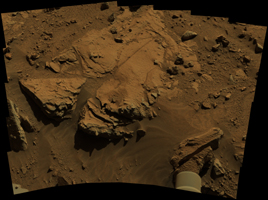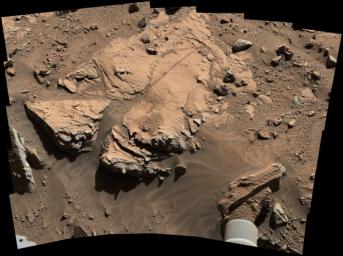
Figure A
High Resolution TIFF file
Click on the image for larger versionNASA's Curiosity Mars rover has driven within robotic-arm's reach of the sandstone slab at the center of this view from the rover's Mast Camera (Mastcam). The rover team plans to have Curiosity examine a target patch on the rock, called "Windjana," with tools on the rover's arm and mast to aid a decision on whether to use Curiosity's drill at this site.
The rock is about 2 feet (about 60 centimeters) across, left-to-right in this image. The informal name for the target comes from Windjana Gorge in Western Australia.
This Martian rock is in a waypoint location called "the Kimberley," where sandstone outcrops with differing resistance to wind erosion result in a stair-step pattern of layers. Windjana is within what the team calls the area's "middle unit," because it is intermediate between rocks that form buttes in the area and lower-lying rocks that show a pattern of striations.
If this target meets criteria set by engineers and scientists, it could become the mission's third drilled rock and the first that is not mudstone.
This view combines several exposures taken by the Mastcam's left-eye camera during the 609th Martian day, or sol, of the rover's work on Mars (April 23, 2014). The component images have been calibrated, linearly scaled and brightened, which results in colors that resemble those that would be seen under daytime lighting conditions on Earth. A version with raw color, as recorded by the camera under Martian lighting conditions, is available as Figure A.
NASA's Jet Propulsion Laboratory, a division of the California Institute of Technology, Pasadena, manages the Mars Science Laboratory Project for NASA's Science Mission Directorate, Washington. JPL designed and built the project's Curiosity rover. Malin Space Science Systems, San Diego, built and operates the rover's Mastcam.
More information about Curiosity is online at http://www.nasa.gov/msl and http://mars.jpl.nasa.gov/msl/.

 Planetary Data System
Planetary Data System













